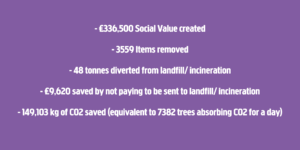Furniture Reuse
Bulky Bob’s For Business is a charity with a mission to End Furniture Poverty. They do this by providing a true reuse programme for businesses, which ensures items of furniture, white goods, mattresses and IT equipment which can be reused make their way to those most in need across the region.
Recent COVID restrictions have seen many refurbishments and remodelling of student accommodations brought forward and Bulky Bob’s are on hand to provide a service which is not only maximises social value as reusable items go to those most in need, but minimises carbon impact by not sending to landfill or manufacturing new items, also resulting in cost savings as opposed to sending for recycling or disposal.

Rooms Group and Student Roost – Capital Gate
Rooms Group are specialist refurbishment and fit out contractor with over forty years’ combined experience, through a capacity to design, produce and install they offer a tailored value orientated service to their clients. Student Roost were working with Rooms Group to completely redevelop the Capital Gate property, which is opposite the Liverpool Royal Hospital and close to the University campus.
Choosing Bulky Bob’s
As a carbon and socially conscious organisation they commit to minimise environmental impact and maximise social value wherever possible.
When redesigning and refurbishing their Capital Gate site they wanted to ensure reuse of as many items as possible so on recommendation from Sitemark Limited, they partnered with Bulky Bob’s who met a tight timescale to remove items in a COVID-secure way for onward reuse.
The Impact
The impact of this project has been immense. £336,500 social value will be created by items being reused by those living in furniture poverty.
Over 3500 items have been removed for repair and reuse across the Liverpool City Region by those most in need. A total of 48 tonnes of waste which would have cost approximately £9,620 to dispose of at landfill or energy from waste, have been diverted, which has a carbon reduction impact equivalent to 7382 trees or 25 cars daily removed from the roads.





